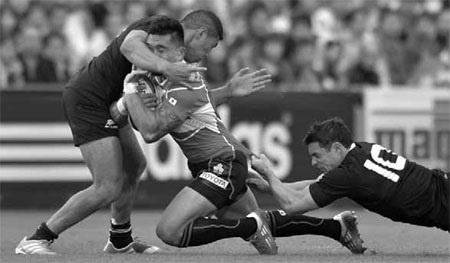Japan glimpses ray of hope in All Blacks blowout
Updated: 2013-11-05 07:12
By Reuters in Tokyo (China Daily)
|
|||||||||||
For New Zealand, its comfortable win over Japan on Saturday will become a mere statistic in its fabled rugby history, even if some will deride the All Blacks for not choosing stiffer competition to warm up for their European tour.
For Japan, though, the 54-6 loss was far more significant, evidence that the wheels of progress, backed by a professional environment and infusion of international expertise, are turning in a country that will host the 2019 World Cup.
Japan's previous two test encounters with the All Blacks, both at World Cups, had been lopsided defeats of 83-7 in 2011 and 145-17 in 1995.
A similar defeat on Saturday for the 'Brave Blossoms', currently ranked 15th in the world, would have been highly detrimental to their build up towards the 2015 World Cup, not to mention the even more important tournament four years later.
As it was, though, Saturday's tenacious and combative performance against the toughest of teams greatly excited a 21,000 crowd at Tokyo's Prince Chichibu Memorial Stadium and proved a point or two.
"New Zealand is undoubtedly the best team in the world," said Japan general manager Kensuke Iwabuchi.
"But we wanted to show ourselves and our fans that they are no longer a presence above the clouds, but a team to beat."
Apart from anything else, it showed Japan's win in June against Wales, albeit an inexperienced Welsh side without its British and Irish Lions, was no fluke.
Many credit the progress in Japanese rugby to the establishment a decade ago of Top League, a semi-professional competition that has drawn coaching staff and top players from around the world.
All Blacks Sonny Bill Williams and Jerome Kaino as well as Springbok Jaque Fourie are among those who have been drawn to Japan by generous salaries.
The Top League has undoubtedly raised the level of rugby and there have been early signs of a trade going the other way, with scrumhalf Fumiaki Tanaka and hooker Shota Horie signing for Super Rugby teams.
The hope is that a two-way interraction between imports and exports to Super Rugby and New Zealand's National Provincial Championship (ITM Cup) will provide Japan with the constant exposure to top level rugby that is key to further development.
"Currently we have a few players playing Super Rugby, and we would like more. It's the same with the ITM Cup. We would like more players playing ITM Cup," said Scott Wisemantel, the Australian technical director who stood in on Saturday as coach for Eddie Jones, who suffered a stroke in October.
"The level of Top League has improved; it's just that week in week out competitive rugby our players need."
The appointment of former Wallabies coach Jones last year represented a continuation of a policy that began in 2007 when the Japanese Rugby Football Union (JRFU) appointed its first national coach from overseas in former All Black John Kirwan.
Kirwan and Jones have not only provided the JFRU with some needed clout in the international rugby community but have helped infuse the national team with a high level of technical expertise.
That was especially evident in the Japanese scrum on Saturday, which surprisingly pushed back the New Zealand pack on a few occasions and were clinical at the lineout, where they also contested the opposition's throw.
Wisemantel credited the improved performance to the tutelage of French scrum coach Marc Dal Maso, one of a number of foreign advisers drafted in by Jones.
|
Japan's Male Sau is stopped by New Zealand's All Blacks Charles Piutau (left) and Daniel Carter during their test match in Tokyo on Saturday. The All Blacks defeated Japan 54-6. Kazuhiro Nogi / Agence France-Presse |
(China Daily 11/05/2013 page23)
Today's Top News
Li urges farmers to plant more in 2014
Xi calls for targeted policies to fight poverty
Separatists spreading skills online
Govt must enact land reform
US dismisses Snowden's plea
Merkel says US ties must not be put at risk
Chengguan try to spruce image with course in Wuhan
More students back from abroad
Hot Topics
Lunar probe , China growth forecasts, Emission rules get tougher, China seen through 'colored lens', International board,
Editor's Picks

|

|

|

|

|

|






